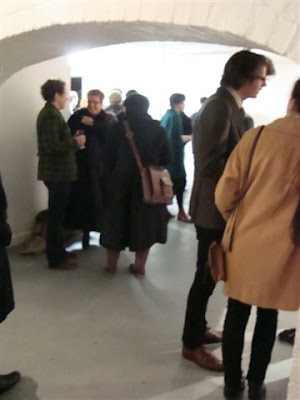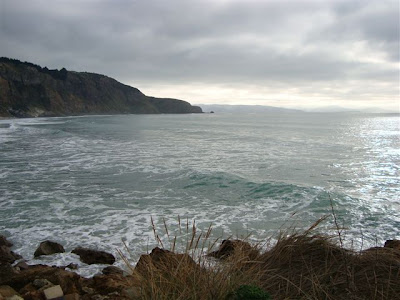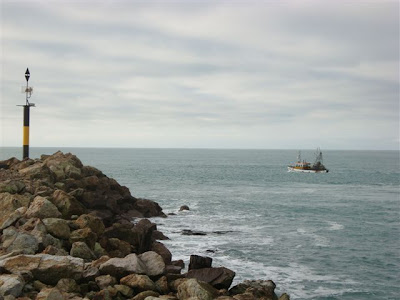Despite its stellar cast - Emily Mortimer, Bill Nighy, Patricia Clarkson - and all its undoubted felicities of setting and atmosphere, I'm not sure I'd see The Bookshop as an entirely successful movie. It's a bit too depressing, for a start.
In fact, from my own (admittedly selfish) point of view, its main virtue was awakening me to the existence of Penelope Fitzgerald's writing.
So, sure enough, next time I was in town I dropped into that home-away-from-home which is Maud Cahill's Jason Books, only to discover - surprise! surprise! - a biography and a collection of letters by the author in question waiting to find me:
Hermione Lee. Penelope Fitzgerald: A Life. Chatto & Windus. London: Random House, 2013.
Reading Hermione Lee's account of her has certainly helped me to understand why Fitzgerald's work tends to fix itself in the memory, and indeed reads like a memorial for an entire era of damp, seedy, post-war British misery.
Oh dear. I'm not really selling it, am I? But then maybe that's the point. Despite that one, career-defining moment when she won the 1979 Booker Prize for her novel Offshore, Fitzgerald's life was pretty short on triumphs and long on endurance.
After a fairly glittering start at Oxford in the late 1930s, an unfortunate marriage to wartime hero and peacetime drunk Desmond Fitzgerald provided the entrée to a couple of decades of poverty in ever more squalid surroundings.
Her star-studded family, the Knoxes ("she was the daughter of Edmund Knox, editor of Punch, and ... a niece of the theologian and crime writer Ronald Knox, the cryptographer Dillwyn Knox, [and] the Bible scholar Wilfred Knox") seem scarcely to have noticed, being far too preoccupied with their own glittering careers to pay much attention to this lone female in the ranks.
Penelope Fitzgerald. The Knox Brothers: Edmund ('Evoe') 1881-1971, Dillwyn 1883-1943, Wilfred 1886-1950, Ronald 1888-1957. 1977. Newton Abbot: Readers Union Group of Book Clubs, 1978.
Revenge is, however, a dish best served cold (not, I'm sure, that she would have put it in quite those terms), and it now seems quite possible that their pinchbeck brilliance will live on mainly grace to her own extraordinary group biography of - what's the collective noun for brothers? a bruise of brothers, perhaps - her father and uncles: needless to add, another prize from the shelves of Jason Books.
Does anyone read Ronnie's detective stories or theological musings nowadays - let alone E. V. Knox's volumes of collected skits from Punch? No, it's the world of Fitzrovia, that pre-swinging Sixties era of Dylan Thomas and Mervyn Peake's novels, that Fitzgerald seems to have been foredoomed to chronicle.
My overarching point, however, is that this is just a typical example of the kinds of serendipitous discoveries which seem to arise naturally when one enters the sacred precincts of Jason Books - some allusion to the Golden Fleece intended in that choice of name, perhaps?
Maud has a magnificent eye for quality, and her shop is well laid-out, well lit, and very reasonably priced. It's hard to imagine a more delightful bookish experience than browsing there, in fact.
Richard F. Burton, trans. The Book of the Thousand Nights and a Night: A Plain and Literal Translation of the Arabian Nights Entertainments. 1885. 10 vols. U.S.A.: The Burton Club, n.d. [c.1940s].
Richard F. Burton, trans. Supplemental Nights to the Book of the Thousand and One Nights with Notes Anthropological and Explanatory. 1886-88. 6 vols. U.S.A..: The Burton Club, n.d. [c. 1940s].
I remember Jason Books from decades ago, when it was located at the back of a tiny alley off High Street (just behind the Simple Cottage vegetarian restaurant). It was there that I bought my first set of Burton's complete Arabian Nights, in the edition pictured above.
When Maud took it over from then owner Richard Poore, it moved to an attic in Lorne Street, and then to its present position behind Freyberg Square. In all of its various incarnations, though, it's been a source of wonders.
The Arabian Nights: The Book of the Thousand Nights and One Night, Rendered into English from the Literal and Complete French Translation of Dr. J. C. Mardrus by Powys Mathers. Introduction by Marina Warner. 6 vols. London: The Folio Society, 2003.
- Vol. 1: with 8 colour illustrations by Kay Nielsen, 375 pp.
- Vol. 2: with 8 colour illustrations by Grahame Baker, 424 pp.
- Vol. 3: with 8 colour illustrations by Debra McFarlane, 424 pp.
- Vol. 4: with 8 colour illustrations by Roman Pisarev, 424 pp.
- Vol. 5: with 8 colour illustrations by Jane Ray, 431 pp.
- Vol. 6: with 8 colour illustrations by Neil Packer, 448 pp.
And, to go full circle, it was there, rather more recently, that I bought the above lavishly illustrated version of E. Powys Mathers' translation of Dr. J. C. Mardrus's fin-de-siècle French translation of the Arabian Nights, probably the most entertaining and readable "complete" version available in English.
Warwick Jordan's Hard-to-Find Books has an even more complex history, briefly summarised as follows on their website:
The legendary Hard to Find Bookshop (although it didn't have a name then) began in a garage in John Street, Ponsonby in 1983. In 1984 it moved to a shop in Onehunga (now David Tua's boxing gym), and in 1988 to a mainstreet Onehunga location. At one point it expanded to nine stores in five different cities until Warwick realised empire building wasn't really his passion. Even so, he did open one more shop in 2013 ... our Dunedin store which also houses our Internet stock. On June 13th 2018 the Onehunga store closed, opening again on 15th June 2018 at our miraculous new location - 2-8 St Benedict's Street, Eden Terrace, Auckland.I was a fairly frequent visitor to the Onehunga store, but even more so now that the business has moved uptown to the debatable land between Upper Queen Street and Symonds Street. It's a wonderful source of back-catalogue items: definitely the best bookshop I know for those nagging gaps in your collection.
Diodorus Siculus. The Library of History. 12 vols. Loeb Classics. London: William Heinemann / Cambridge: Harvard University Press, 1960, 1961, 1962, 1963, 1967, 1976, 1977, 1989.Josephus. Works. 9 vols. Loeb Classics. London: William Heinemann / Cambridge: Harvard University Press, 1961, 1966.
- Books I-II: 1-34, Trans. C. H. Oldfather (1936)
- Books II: 35-end, III, IV: 1-58, Trans. C. H. Oldfather (1935)
- Books IV: 59-VIII, Trans. C. H. Oldfather (1939)
- Books IX-XII: 40, Trans. C. H. Oldfather (1946)
- Books XII: 41-XIII, Trans. C. H. Oldfather (1950)
- Books XIV-XV:19, Trans. C. H. Oldfather (195
- Books XV: 20-XVI: 65, Trans. Charles L. Sherman (1952)
- Books XVI: 66-95, XVII, Trans. C. Bradford Welles (1963)
- Books XVIII-XIX: 1-65, Trans. Russel M. Geer (1947)
- Books XIX: 66-110, XX, Trans. Russel M. Geer (1954)
- Books XXI-XXXII, Trans. Francis R. Walton (1967)
- Books XXXIII-XL / Index, Trans. Francis R. Walton & Russel M. Geer (1967)
Polybius. The Histories. Trans. W. R. Paton. Introduction by Col. H. J. Edwards. 6 vols. 1922, 1922, 1923, 1925, 1926, 1927. Loeb Classics. London: William Heinemann / Cambridge: Harvard University Press, 1967, 1968, 1972.
- The Life / Against Apion, Trans. H. St. J. Thackeray (1926)
- The Jewish War, Books I-III, Trans. H. St. J. Thackeray (1927)
- The Jewish War, Books IV-VII, Trans. H. St. J. Thackeray (1928)
- Jewish Antiquities, Books I-IV, Trans. H. St. J. Thackeray (1930)
- Jewish Antiquities, Books V-VIII, Trans. H. St. J. Thackeray & Ralph Marcus (1934)
- Jewish Antiquities, Books IX-XI, Trans. Ralph Marcus (1937)
- Jewish Antiquities, Books XII-XIV, Trans. Ralph Marcus (1943)
- Jewish Antiquities, Books XV-XVII, Trans. Ralph Marcus & Allen Wikgren (1963)
- Jewish Antiquities, Books XVIII-XX / General Index, Trans. Louis H. Feldman (1965)
I once horrified Bronwyn by buying a huge mountain of Loeb Classics Greek Historians from the Onehunga shop. I hope the guy who sold them to me was joking when he said that this would guarantee his wages for the next week, but who knows?
Grann, David. The Lost City of Z: A Legendary British Explorer's Deadly Quest to Uncover the Secrets of the Amazon. 2009. Pocket Books. London: Simon & Schuster UK Ltd., 2010.
Another, rather odder experience was my attempt to find a copy of The Lost City of Z in the Hard-to-Find branch in Dunedin. I can't quite remember why I was so anxious to read it - I guess I must have just seen the film - but I knew that if it was available anywhere, it would be available there.
And sure enough, it was! That's the great thing about Hard-to-Find: the sheer critical mass of books they stock make them the best place to look for particular troublesome items.
The funny thing came when I whipped out my Society of Authors membership card, which came with a list on the back of 'participating bookstores' in their 10% off for struggling writers scheme. Hard-to-Find was listed among them, and I'd used it many times at the Auckland store.
"Society of Authors? Is that even a thing? I mean, I've heard of the screenwriters guild and so on, but - did you make it up yourself?" asked the young lady serving at the counter that day.
"No, no, it's a real thing," I expostulated. "It's affiliated with PEN International."
"What's PEN International?" she riposted.
At this point I felt I'd better quit while I was ahead. Nice to know that someone working in a bookshop had so little interest in the people who actually produce the goods she was selling, but I guess it's good to be reminded of our collective insignificance from time to time.
It was pretty funny at the time, though. I'm sure she remained quite unconvinced by all my attempts to prove that there was such a thing as the Society of Authors, and the whole thing does sound a bit nerdy when you really come down to it ...
Stillinger, Jack, ed. The Poems of John Keats: The Definitive Edition. London: Heinemann Educational Books Ltd., 1978.
I've bought a slew of books - fiction, poetry, travel - from the new brick edifice in St. Benedict's Street. It's now almost as choked with stock as the old Onehunga shop was. The above edition of John Keats was a very pleasant addition to their number. Honestly, you never know what you're going to see when you go in there, which is another good reason for rationing myself to occasional visits.
•


























































